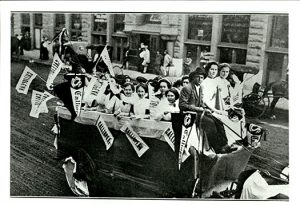by Anna Redhair, Graduate Assistant
In honor of Women’s History Month in March, Baylor University Libraries Special Collections and the Institute for Oral History launched a website for researching the various women’s collections and oral memoirs held across campus. The website includes materials from the Institute for Oral History; Armstrong Browning Library and Museum; Central Libraries Special Collections; Keston Center for Religion, Politics, and Society; The Texas Collection; and W. R. Poage Legislative Library.
What information can be found on the site?

The Women’s Collections website contains searchable information on individual women, women’s groups, and topics relating to women. Each entry contains a brief biography or description, a photo (if available), link to the finding aid or oral memoir (if available), who to contact for more information, and links to related collections. Each entry is also connected to relevant subject terms, such as education, Baptist, or World War II. The site features women from across disparate time periods, locations, and occupations, yet brings them together to celebrate their accomplishments and contributions all in one place. The following three examples demonstrate the different types of collections featured on the site.
Grace Rosanky Putnam Jones joined the Women’s Air Force Service Pilots (WASP) training program during World War II and eventually became the Commanding Officer of her unit. Following the war, she achieved recognition as a runway and commercial model in New York City. While living abroad with her husband, Jones became the first American woman to perform the Japanese tea ceremony. The couple later settled in Salado, Texas, where Jones opened an internationally famous couture fashion store, Grace Jones of Salado. She operated the store for almost 40 years before her retirement in 2000 and passed away eight years later.
The Calliopean Society was the first female literary society established at Baylor University in 1867. Two male literary societies, the Philomathesians and Erisophians, already existed. The literary societies participated in debates and held competitions as part of university events such as San Jacinto Day. The group provided young women with the opportunity to read essays and allowed them to gain leadership experience. Each society had their own library, which they donated to the university library in exchange for scholarship funds. The Calliopean Society’s popularity waned in the 1920s as additional clubs and groups came to Baylor, but the society remains an important part of the university’s history.

The Equal Rights Amendment was first introduced to Congress in 1921. The amendment has undergone many changes over the years yet has not been ratified. This entry focuses on debates surrounding the Equal Rights Amendment in Texas congressional records as well as the viewpoints of various representatives and constituents.
How does a researcher use the site?
If a researcher has a specific woman or organization in mind, he or she can search the name using the search bar. Once on the page, the researcher can click on the link to the finding aid or oral memoir to find out more information. The finding aid provides more detailed information about the contents of the collection and includes a box listing. Researchers can email the library where the materials are housed and request to view the boxes they are particularly interested in. The oral memoir link connects to a transcript of the interview. All the entries are connected to subject terms and researchers can search using these terms as well. STEM, women of color, and missionary are all possible subject terms. If a researcher is unsure of where to start, he or she can click on the “All Subjects” on the right-hand side of the screen just under the search bar, which will list all the entries currently on the site. Researchers are also able to email womenscollections@baylor.edu for reference requests or additional assistance with the site.
The Women’s Collections at Baylor University website is a work in progress, and the libraries will continue to add more women, women’s groups, and women’s topics. We hope the site increases awareness and use of the women’s collections at Baylor, so please check it out!
No Comments